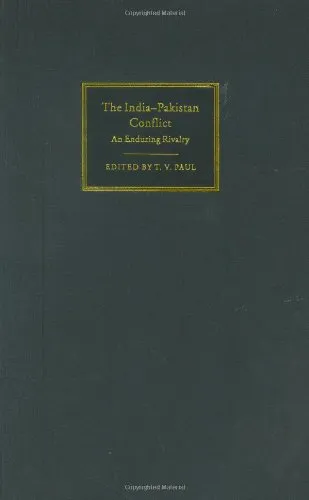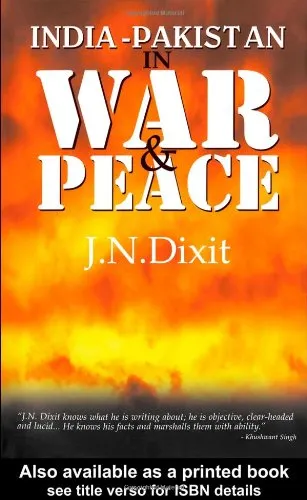The India-Pakistan Conflict: An Enduring Rivalry
4.0
Reviews from our users

You Can Ask your questions from this book's AI after Login
Each download or ask from book AI costs 2 points. To earn more free points, please visit the Points Guide Page and complete some valuable actions.Related Refrences:
The India-Pakistan Conflict: An Enduring Rivalry
The enduring rivalry between India and Pakistan is a hallmark of South Asian geopolitics, characterized by decades of military, political, and socio-economic confrontations. In the book "The India-Pakistan Conflict: An Enduring Rivalry," T. V. Paul, along with expert contributors, delves into this complex and multifaceted relationship, providing an in-depth analysis of the rivalry's historical roots, contemporary dynamics, and its implications for regional and global security. The insights offered by this book contribute significantly to the discourse surrounding conflict management and peacebuilding in conflict-prone regions.
Detailed Summary of the Book
This scholarly work provides an expansive overview of the India-Pakistan conflict from multiple angles, using historical, political, and psychological lenses to dissect one of the world's most enduring conflicts. The book traces the origins of the rivalry to the partition of British India in 1947, a period that laid the foundation for future discord. Subsequent chapters explore key events such as the wars of 1947-48, 1965, and 1971, as well as the Kargil conflict in 1999.
The book emphasizes the role of nuclear weapons in South Asian security dynamics, evaluating their impact on deterrence and stability in the region. Furthermore, the role of major powers, including the United States and China, is scrutinized to understand how external interventions have shaped the conflict's trajectory. The contributors also explore non-state actors, public perceptions, and the economic costs of the rivalry, painting a comprehensive picture of the conflict's multi-layered nature.
Key Takeaways
- The historical roots of the India-Pakistan conflict are deeply embedded in the partition of 1947, influencing subsequent political relationships.
- Understanding the nuclear dynamics between the two nations is crucial for analyzing regional security and the prospect of conflict escalation.
- External powers play a significant role, sometimes exacerbating tensions, sometimes serving as mediators for conflict resolution.
- The conflict has significant socio-economic implications, diverting resources away from development to military expenditure.
- Public perception and psychological elements remain critical in maintaining the enduring rivalry, necessitating nuanced policy approaches for peacebuilding.
Famous Quotes from the Book
"The India-Pakistan rivalry is not just a territorial conflict; it is a battle for identity and legitimacy in the eyes of their people and the world."
"The nuclear dimension added a perilous edge to the subcontinent's hostility, creating an intricate balance of power that defies simplistic solutions."
Why This Book Matters
"The India-Pakistan Conflict: An Enduring Rivalry" is vital for scholars, policymakers, and anyone interested in understanding the intricacies of one of the longest-standing conflicts in modern history. The book's comprehensive approach, dissecting both historical and contemporary aspects, provides readers with a nuanced understanding of the factors perpetuating the rivalry. It challenges conventional narratives by including diverse perspectives and encourages dialogue on pathways to peace.
The book is not only a scholarly examination but also a call to action for international audiences to engage with South Asian peace processes. By shedding light on the underlying causes and the current state of affairs, it empowers readers to think critically about conflict resolution strategies and their implementation in similarly complex global situations.
Free Direct Download
You Can Download this book after Login
Accessing books through legal platforms and public libraries not only supports the rights of authors and publishers but also contributes to the sustainability of reading culture. Before downloading, please take a moment to consider these options.
Find this book on other platforms:
WorldCat helps you find books in libraries worldwide.
See ratings, reviews, and discussions on Goodreads.
Find and buy rare or used books on AbeBooks.
1390
بازدید4.0
امتیاز50
نظر98%
رضایتReviews:
4.0
Based on 0 users review
"کیفیت چاپ عالی بود، خیلی راضیام"



